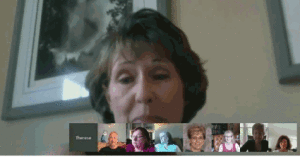 Summer PD 2015 just ended. A couple dozen of us–teachers, library media specialists, tech integrationists, lab teachers–gathered virtually for three weeks to experiment with some of the hottest tech tools available for the classroom–Google Apps, differentiation tools, digital storytelling, visual learning, Twitter, blogs, Common Core and tech, backchannels, digital citizenship, assessment, and more (12 topics in all). It was run like a flipped classroom where class members picked 60% of daily topics, then they read, tested and experimented. Failed and tried again. Asked questions. They shared with colleagues on discussion boards, blogs, Tweets. Once a week we got together virtually (via Google Hangout or a TweetUp) to share ideas, answer questions, and discuss nuances.
Summer PD 2015 just ended. A couple dozen of us–teachers, library media specialists, tech integrationists, lab teachers–gathered virtually for three weeks to experiment with some of the hottest tech tools available for the classroom–Google Apps, differentiation tools, digital storytelling, visual learning, Twitter, blogs, Common Core and tech, backchannels, digital citizenship, assessment, and more (12 topics in all). It was run like a flipped classroom where class members picked 60% of daily topics, then they read, tested and experimented. Failed and tried again. Asked questions. They shared with colleagues on discussion boards, blogs, Tweets. Once a week we got together virtually (via Google Hangout or a TweetUp) to share ideas, answer questions, and discuss nuances.
The class awarded a Certificate based on effort, not end product. Here are my takeaways as moderator of this amazing group:
- They are risk takers. They kept trying long beyond the recommended hour a day in some cases.
- They were curious. They wanted to get it right, see how it worked.
- They are life long learners. Some had been teaching for thirty years and still enthusiastically embraced everything from twitter to the gamification of education.
- They were problem solvers. I often heard, ‘if I tweak it here, I can solve this problem’.
- They are inquirers. Lots of questions, often directed to each other–for clarification, personal experience, or simple collegiality.
- Everyone’s tech ed experience is different. I was thrilled to hear so many different takes on infusing tech into their classes.
- Participants–like students–learned in different ways. When the standard reading materials or watching a video didn’t work, we used other options to explain a prickly topic (like Twitter–that was an experience!)
- Time after time, participants took responsibility for their own learning. Each had specific goals for the class and never lost sight of them.
- Participants worked together as a Personal Learning Network to understand. Sure, I was there to answer questions, but often, another classmate jumped in with solutions and how they made things work. They were connected educators.
 Here are 17 take-aways I heard from class members or experienced myself:
Here are 17 take-aways I heard from class members or experienced myself:
- They enjoyed meeting online to chat on blogs, help each other on the Discussion Forums, mull over ideas on the Google Hangouts, and explore TweetUps. They grew professionally from this collaboration.
- Because the weekend get-togethers were online, via Google Hangouts or Twitter, students were able to join from wherever they were. This included a baseball game, a campsite, and a car (on its way from here to there). That is today’s learning–taking it to students.
- Often, students reached outside their comfort zone to try tools they either had never used or thought they couldn’t use. They tried-failed-tried again, all with a positive, can-do attitude.
- When students were given the opportunity to pick their own favorite tool (one they used in their classes and wanted to share with Summer PD colleagues), they became the teacher. I learned about approaches I hadn’t considered before.
- 1:1 is not the norm in schools, rather the goal. Best practices for sharing tech ed tools from carts and labs are still in demand.
- Screencasting was quite popular, both in this class and my two grad school classes.
- Exit tickets are a lot more popular than I had thought. Teachers eagerly looked for tech options to traditional ‘fill out this sheet of paper’ approaches to ending class and/or assessing learning
- Learn to follow directions was noted several times as an important take-away.
- Students tested lots of apps and shared their thoughts with classmates, like a Tech Ed Thinktank.
- One of the class goals was to teach tech ed problem solving by doing. Meaning: I didn’t jump in to answer questions when students were stuck and they didn’t automatically ask for help before trying their own strategies. This modeled not just problem solving but critical thinking.
- It was noted by several HS teachers in the group that it’s difficult to teach keyboarding in high school because students think they know that subject–even if they don’t.
- Many teachers noted that it was as important to them to validate their approach to teaching technology in their classroom as it was to extend their learning.
- Barometers to success are as likely to be effort and failure as a perfectly turned-out project.
- Teaching digital citizenship remains a challenge–as much because it needs to be organically blended into all learning as that it is not well-understood.
- TweetUps were fun, like ‘text messaging on steroids’.
- I added an extra Google Hangout on Curriculum Maps (at the request of several students). Optional, but it ended up a lively discussion on the who-what-when-where-why of Curriculum Maps in education.
- A comment from one student: “After taking this class, I’m not panicked anymore!”
Want a student’s perspective? Check out these class blogs:
If this sounds like something you’d like to participate in, consider my grad school class (MTI 562) coming up in September. I also offer an adapted version of the Tech-infused Teacher as school-based Professional Development. Email me at [email protected] if that’s of interest to your administrators.
To find out new training as it becomes available, sign up for my publisher’s newsletter and you’ll be the first to hear.
Jacqui Murray has been teaching K-8 technology for 15 years. She is the editor/author of over a hundred tech ed resources including a K-8 technology curriculum, K-8 keyboard curriculum, K-8 Digital Citizenship curriculum. She is an adjunct professor in tech ed, CSG Master Teacher, webmaster for four blogs, an Amazon Vine Voice book reviewer, Editorial Review Board member for Journal for Computing Teachers, CAEP reviewer, CSTA presentation reviewer, freelance journalist on tech ed topics, and a weekly contributor to TeachHUB. You can find her resources at Structured Learning.




































9 thoughts on “17 Take-aways from Summer PD”
Comments are closed.